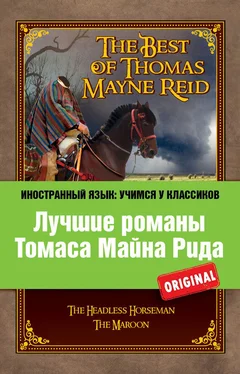sangre– blood ( Spanish )
Madre de Dios– the Holy Virgin, Mother of Jesus ( Spanish )
Popish – Catholic
leperos– rascals ( Spanish )
table-d’hôte – 1. a large dinner table for many people in hotels and restaurants; 2. a fixed menu at a fixed price
bon vivant – a person who enjoys life and lives to his/her own pleasure
Scouts – rangers, reconnoiterers
carcass – a dead body of a human being or animal
phantasmagoria – fantastic, unreal pictures; ghostly images
Iberian – Iberian people used to live in the southeast of Spain; in the text, Iberian means Spanish
Aztecan – related to the Aztec people
Vandyke – Anthony Van Dyck (1599–1641), the most famous Flemish painter; beards and collars in the portraits by Van Dyck came into fashion under his name: Vandyke beard, Vandyke collar
cuartilla– the four of them ( Spanish )
conpaisanos– here: compatriots ( Spanish )
mezcal – a strong alcoholic drink ( Spanish )
pueblita– a small settlement ( Spanish )
Mein Gott– My God! ( German )
Aguardiente – Mexican rum ( Spanish )
musteños– mustangs ( Spanish )
tasajo – here: meat
confrères– comrades, friends ( French )
gringo – a contemptuous name for Americans in Latin American countries
Saurian – one of lizard species
Ochone! – Oh, my God! ( Irish )
goblins – in European folklore, goblin is a malicious spirite attached to a household, who makes noise, disturbs people, punishes disobedient children, etc.
Ishmaelites – also called Medianites, in Old Testament, nomadic tribes living in the Arabic deserts and engaged in banditry
butt – a target of or for smth
Castilian – the Castilian dialect of the Spanish language; in the 15 thcentury it became the literary language of Spain and its colonies
camarados= camaradas – comrades ( Spanish )
Cervantes – Miguel de Cervantes (1547–1616), the most famous and celebrated Spanish writer, the author of ‘Don Quixote’
boracho= borracho – drunk ( Spanish )
the Lady of Guadaloupe – also called the Virgin of Guadeloupe, patron saint of Mexico; the Virgin Mary appeared in vision to one of the citizens in 1531, and since then her image has become a national symbol of Mexico
Váyate! – an exclamation which here means Hurry up! ( Spanish )
albur– a game ( Spanish )
vagabondo– tramp, vagrant ( Spanish )
Toledos – swords made of Toledo steel; Toledo is the city in Spain southwest of Madrid, famous for its steel, swords and knives since the 1 stcentury BC
cañada– canyon, gorge ( Spanish )
Navajo – also spelled Navaho , one of the largest North American Indian peoples in the USA
Santos Dios!– God Almighty! ( Spanish )
Mil demonios!– A thousand devils! ( Spanish )
papelcito– a note ( Spanish )
Hasta luego!– See you soon! ( Spanish )
hijo de algo– someone’s son ( Spanish )
estribo– stirrup ( Spanish )
petto– miniature ( Spanish )
cuesta– slope, rise ( Spanish )
salteador– robber, villain ( Spanish )
Ay de mi – an exclamation of sorrow, disappointment, grief ( Spanish )
Canova – Antonio Canova (1757–1822), a famous Italian sculptor, the representative of Neoclassicism in art
coup d’éclair– a bolt of lightning ( French )
herradero– branding of cattle ( Spanish )
Amazonian – related to the Amazons , the nation of women warriors in Greek mythology
coup d’oeil– view, sight, look, glance (French)
Quién sabe?– Who knows? ( Spanish )
Mil gracias– Many thanks ( Spanish )
“Doesn’t that bate Banagher?” – ‘Isn’t it incredible?’; from the expression ‘Well, that beats Banagher.’; Banagher is a town in Ireland famous for its historical places of interest
Moses – Hebrew prophet, religious and national leader of the 14 th–13 thcenturies BC, who saved his people from Egyptian slavery
douche– shower ( French )
nolens volens – volens nolens ( Latin ) – whether one wishes or not
Webster – Noah Webster (1758–1843), American lexicographer, the author of ‘American Spelling Book’ and ‘ American Dictionary of the English Language’; he was also a teacher, lecturer, grammarian and journalist
un día de novedades– a day of news (Spanish)
Читать дальше
Конец ознакомительного отрывка
Купить книгу












